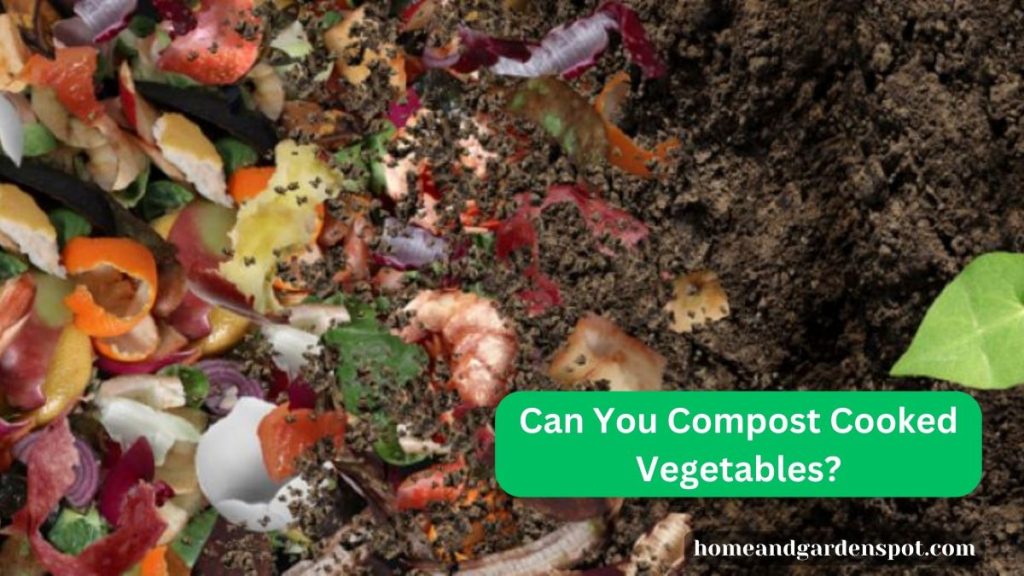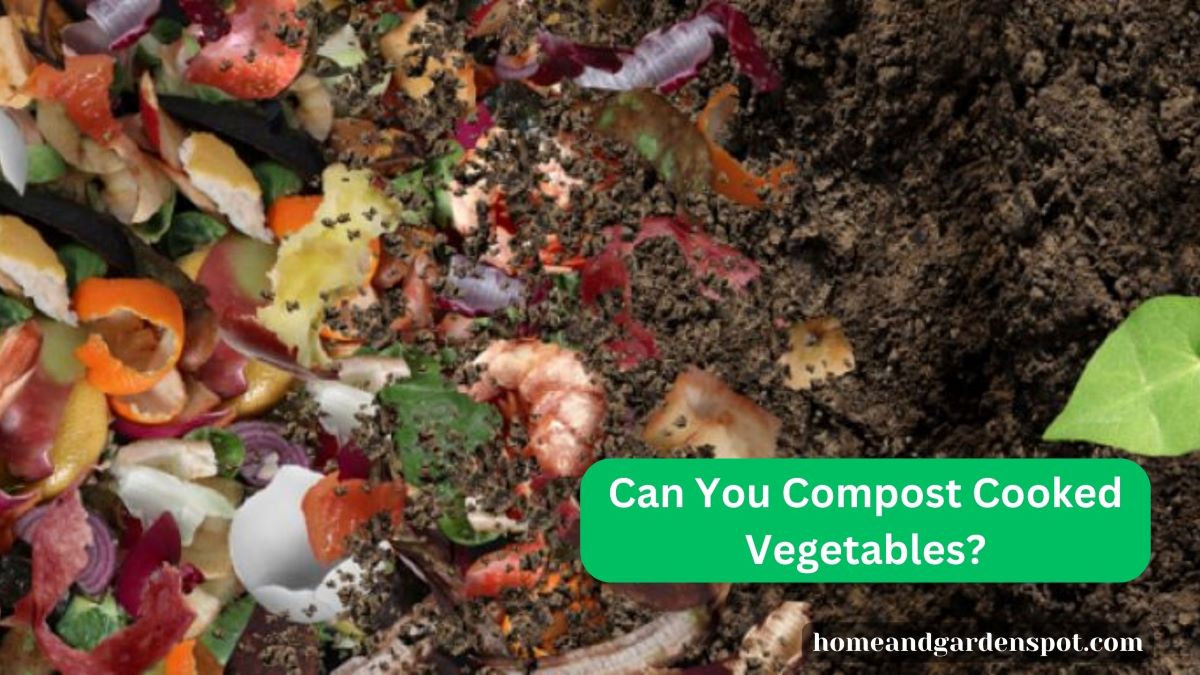I enjoy growing my vegetables and herbs and harvesting them for my meals. But sometimes, I end up with more vegetables than I can eat, or some get overcooked or spoiled.
I don’t like throwing them away because I know they are valuable resources that can be reused. Then, I wondered if cooked vegetables could be composted.
My research and hypothesis discovered that cooked vegetables can be composted. You can compost cooked vegetables because they break into organic matter and enrich the compost with valuable nutrients.
In this blog post, I will share how to compost cooked vegetables, what types are good for composting, and what types you should avoid.
I will also give you some ideas on using your leftover vegetables in other ways, including composting items like sunflower seed shells. Keep reading!

Do Cooked Or Raw Vegetables Compost Faster?
Cooked vegetables tend to compost faster than raw vegetables. This is because the cooking process triggers vegetables to break down, so they rot faster than raw vegetables.
In addition, bacteria are drawn to cooked vegetables in the compost pile due to the heat they give off, which speeds up the composting process.
However, not all cooked vegetables are suitable for composting. You should avoid adding cooked vegetables with oils, sugars, sauces, animal products, or excess salt, as these can cause odors, pests, and imbalances in the compost pile.
You should also balance out the compost pile by adding high-carbon, low-moisture materials like paper, straw, and sawdust.
Factors to Consider To Consider Before Composting Cooked Vegetables
Cooked vegetables refer to vegetables subjected to heat and various culinary techniques, such as boiling, steaming, roasting, or frying.
They are often seasoned and may contain added ingredients like spices, oils, or sauces. Below are the factors to consider:
1. Ingredients Used In Cooking
The compostability of cooked vegetables largely depends on the ingredients used during cooking. Vegetables, being organic matter, are inherently compostable.
However, if you’ve added non-compostable elements like meat, dairy, or processed foods, it can complicate the composting process.
These ingredients can introduce pathogens or attract pests to your compost pile, so it’s advisable to avoid them.
2. The Cooking Methods
The cooking method employed can impact the compostability of vegetables.
Boiled or steamed vegetables are generally easier to compost because they are often plain and free from added fats or oils.
Roasting or frying vegetables can introduce oils or fats, which, in excess, can create a greasy, anaerobic (low oxygen) environment in the compost pile, hindering decomposition.
3. The Kind of Seasonings and Sauces
Seasonings and sauces can flavor cooked vegetables but may contain salt, sugar, or artificial additives. While these components won’t necessarily prevent composting, moderation is key.
Excessive salt can disrupt the balance of microorganisms in the compost pile, so it’s wise to use these seasonings sparingly.
How To Compost Cooked Vegetables
1. Choose The Right Vegetables
Not all cooked vegetables are suitable for composting. You should avoid vegetables cooked with oils, fats, sugars, sauces, meats, dairy products, or excessive salt.
These ingredients can make your compost pile smell bad, attract pests, and slow decomposition. You can compost plain cooked vegetables or season with herbs and spices.
2. Wash Off The Vegetables
Before adding the cooked vegetables to your compost pile, wash them thoroughly to remove any traces of oil, sauce, or other unwanted ingredients.
This will also help reduce the moisture content of the vegetables, which can affect the balance of your compost.
3. Chop The Vegetables Into Small Pieces
Cutting the cooked vegetables into smaller pieces will help them break down faster and more evenly in your compost pile.
You can use a knife, a food processor, or a blender to chop the vegetables. The smaller the pieces, the better.
4. Mix The Vegetables With Other Compost Materials
Cooked vegetables are high in nitrogen, an essential element for composting. However, too much nitrogen can cause your compost pile to overheat, smell bad, and lose nutrients.
To prevent this, you need to balance the nitrogen-rich cooked vegetables with carbon-rich materials, such as dry leaves, straw, paper, cardboard, or wood shavings.
A good rule of thumb is to use a ratio of 2 parts carbon to 1 part nitrogen by volume.
5. Bury The Vegetables In The Middle Of Your Compost Pile
To avoid attracting pests and flies, bury the cooked vegetables in the center of your compost pile, where they will be covered by other materials and decompose faster.
This will also help maintain your compost pile’s temperature and moisture level.
6. Turn Your Compost Pile Regularly
To speed up the composting process and ensure even decomposition, you should turn your compost pile every few days or weeks, depending on the size and type of your compost bin.
Turning your compost pile will aerate it and distribute the heat and moisture. You can use a shovel, a pitchfork, or a compost aerator to turn your compost pile.
7. Use Your Finished Compost
After several months, your cooked vegetables and other materials will have turned into dark, crumbly, and earthy-smelling compost that you can use in your garden or lawn.
You can tell when your compost is ready by its appearance, smell, and temperature. It should look like soil, smell like earth, and feel cool.
You can use your finished compost as a fertilizer, a soil amendment, or a mulch for your plants.
Benefits Of Using Cooked Vegetables
Using cooked vegetables for composting can have several advantages, such as:
1. Speeding Up The Composting Process
Cooked vegetables can be better for composting in some instances. The cooking process triggers vegetables to break down, rotting faster than raw vegetables.
Additionally, bacteria are drawn to cooked vegetables in the compost pile due to the heat they give off, which speeds up the composting process.
2. Providing A Rich Source Of Nitrogen
Cooked vegetables are generally high in nitrogen, an essential element for composting. Nitrogen helps the microorganisms in the compost pile to multiply and decompose the organic matter.
However, too much nitrogen can cause problems, such as overheating, odors, and nutrient loss.
Therefore, it is important to balance the nitrogen-rich cooked vegetables with carbon-rich materials, such as paper, straw, and sawdust.
3. Reducing Food Waste And Environmental Impact
Composting cooked vegetables is a resourceful way to turn food waste into a useful product that can help farmers increase crop yields, provide a local resource for gardens, parks, and landscapers, restore habitats, and improve contaminated or degraded soils.
Composting also reduces the amount of food waste that ends up in landfills, where it produces methane, a potent greenhouse gas that contributes to climate change.
What Are The Cooked Vegetables That Can Be Composted?
Some cooked vegetables that can be composted are:
- Leafy greens: Spinach, kale, arugula, or collard greens are rich in nitrogen and break down quickly.
- Squashes: Summer and winter squashes are also high in nitrogen and moisture, so balance them with carbon-rich materials like dry leaves or straw.
- Cruciferous veggies: Cauliflower, broccoli, brussels sprouts, cabbage, and kohlrabi have strong fibers and may take longer to decompose, so chop them into small pieces before adding them to your bin.
- Potatoes: Potatoes and their peels can be composted as long as they are not green or sprouted. Green potatoes contain a toxic substance called solanine that can harm your plants. Sprouted potatoes can grow in your compost pile and take up space and nutrients.
- Corn: Corn husks, cobs, and kernels can be composted. Corn cobs are hard and woody, so they will decompose slowly. You can simplify the process by grinding or cutting them into smaller pieces.
- Tomatoes: Tomatoes and their stems and any rotten or browning chunks of otherwise usable produce can be composted. Tomatoes are acidic and may lower the pH of your compost pile, so add some lime or wood ash to balance it out.
Can I Compost Cooked Potatoes?
Yes, you can compost cooked potatoes if they are not cooked with oils, sugars, sauces, animal products, or excess salt. These ingredients can cause problems in your compost pile, such as odors, pests, and imbalances.
Cooked potatoes are rich in nitrogen and will decompose faster than raw potatoes2.
However, you should also add some carbon-rich materials, such as paper, straw, or sawdust, to balance out your compost pile and prevent it from becoming too wet or smelly.
You should also ensure that your cooked potatoes are not infected with potato blight, a fungal disease that can spread to your crops.
Potato blight causes dark patches and spoilage on the potatoes. If you are composting potatoes from your garden, inspect them for any signs of blight.
If you are composting potatoes from the grocery store, you don’t have to worry about this issue.
To compost your cooked potatoes, chop them into smaller pieces and bury them under a layer of other materials in your compost pile.
This will help them break down faster and avoid attracting unwanted animals. You can compost the peelings, the insides, or the whole potatoes. Some plant-based seasonings, like herbs, are fine for your compost bin.
What Can I Do To Cooked Vegetables Cannot Be Composted?
You can do some things with cooked vegetables that cannot be composted, depending on how they were cooked and what ingredients they contain. Here are some possible options:
1. If the vegetables were cooked with oil, butter, sauce, or meat, you can try to use them in other recipes, such as soups, omelets, salads, or sandwiches.
You can freeze them later or share them with a friend or neighbor who might appreciate them.
2. If the vegetables are spoiled or moldy, you should not eat or compost them. You can throw them away in a sealed bag or bin or find a local facility that accepts food waste for anaerobic digestion.
Anaerobic digestion is a process that converts organic waste into biogas and fertilizer in a closed system.
Conclusion
It is possible to compost cooked vegetables. Cooked vegetables, as organic matter, possess the potential to break down and contribute valuable nutrients to your compost pile.
However, this process is contingent upon several factors, including ingredients, cooking methods, and any seasonings or sauces incorporated.
Finally, composting cooked vegetables represents an environmentally friendly choice that reduces the burden of food waste in landfills and contributes to the creation of healthier soils and greener landscapes.

Leave a Reply